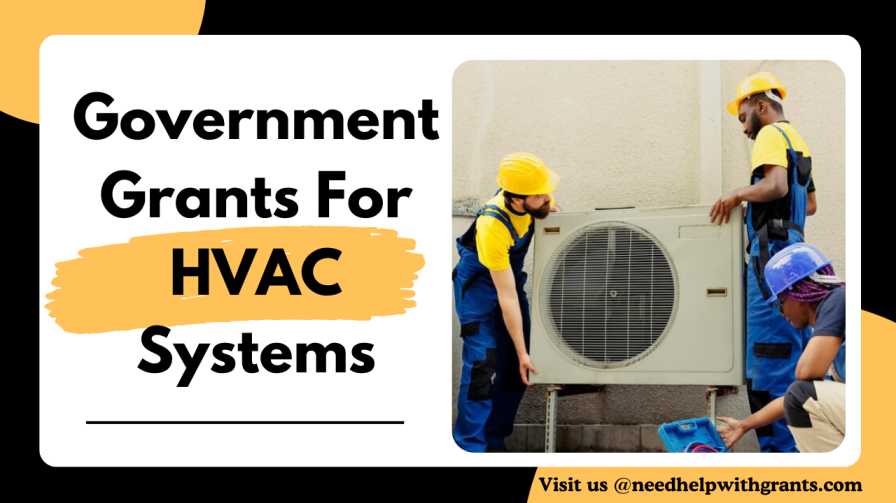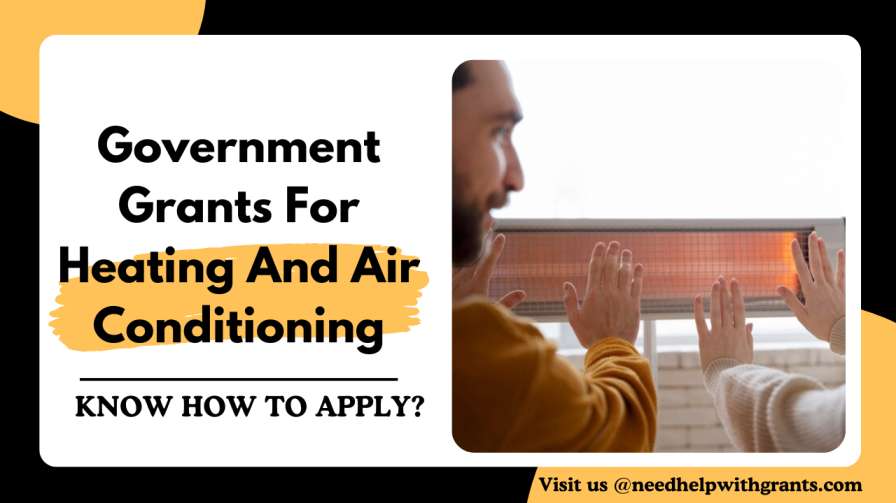Government Grants For HVAC Systems
Heating, ventilation, and air conditioning (HVAC) systems play an important role in maintaining the comfort and energy efficiency of our homes. However, updating or replacing HVAC systems can be expensive. Fortunately, government grants and programs aim to maximize these improvements for homeowners. In this blog post, we explore some of the key industries and financing options available.
Key Takeaways:
Government subsidies and rebates can reduce the financial burden of replacing your HVAC system.
Eligibility varies by program and location but typically targets low-income families, seniors, and rural homeowners.
Popular programs include the Weather Assistance Program, Energy Efficiency Space Credit, and Energy Star coverage.
Research local policies and gather necessary documentation before applying.
Understanding HVAC Systems
Before getting into specific government assistance, it’s important to understand what HVAC systems are and why it’s worth upgrading.
What is an HVAC System?
The HVAC system controls the heating, cooling, and ventilation of the building. This includes things like furnaces, air conditioners, heat pumps, and ductwork. Modern HVAC systems are designed to be more energy-efficient and environmentally friendly than older models.
Benefits of Upgrading your HVAC System
- Energy efficiency: New systems use less energy to heat or cool your home, lowering your utility bills.
- Improved ventilation: Modern HVAC systems improve indoor air quality by reducing pollutants and allergens.
- Improved comfort: New systems provide better temperature control and more consistent heating and cooling.
- Environmental Impact: Improved systems are more environmentally friendly, reducing your carbon footprint.
Types of Government Grants for HVAC Systems
Government support for HVSC programs comes from a variety of sources, including federal, state, and local governments. These grants are designed to promote energy efficiency and help homeowners make necessary changes.
State Subsidies
The federal government offers several programs aimed at improving household energy efficiency. Here are some of the more notable features:
1. Weather Assistance Program (WAP)
The Weatherization Assistance Program provides funding to increase energy efficiency in low-income households. While the primary focus is on climate controls such as insulation and sealing, it can also cover HVAC upgrades.
Eligibility: This program is available to low-income households, with priority given to the elderly, the disabled, and families with children.
How to apply: Applications are normally processed through local weather stations. You can find your local office through the Department of Energy website.
2. Low-Income Home Energy Assistance Program (LIHEAP)
LIHEAP helps low-income families with their energy bills, including heating and cooling bills. It can be used to pay for HVAC repairs or replacements.
Eligibility: Eligibility is based on income, household size, and energy costs. Each country sets its own guidelines.
How to Apply: Applications are reviewed at the state level. Contact your county LIHEAP office or website for information on how to apply.
3. State Grants
Many states have programs to promote energy efficiency and support HVAC upgrades. These policies can vary widely, so it’s important to research what’s available in your state.
4. State Energy Program (SEP)
The State Energy Program provides funding to states for energy efficiency and renewable energy projects. Each state has variations in how these funds are spent, including for HVSCs.
Eligibility: Eligibility requirements vary from state to state.
How to Apply: Contact your state energy agency or website for information on available programs and how to apply.
5. Discounts and Incentives
Many states offer rebates and incentives for homeowners who install energy-efficient HVAC systems. These programs often offer direct reimbursement or tax incentives for the purchase and installation of qualifying equipment.
Eligibility: Generally, eligibility requires the purchase of an energy-efficient appliance that meets specific standards.
How to apply: Check with your county energy department or utility company for available reimbursement fees and the application process.
Local Grants
In addition to federal and state policies, local governments and utilities often offer subsidies and incentives to promote energy efficiency.
1. Utility company exemption
Many utility companies offer rebates to customers who install energy-efficient HVAC systems. These systems are designed to reduce overall energy consumption and can significantly reduce the cost of new equipment.
Eligibility: Usually based on the purchase and installation of proper equipment.
How to apply: Contact your utility company or check their website for information on available discounts and how to apply.
2. Urban policies
Some cities and counties require residents to control their HVAC systems. These programs vary widely, so it’s worth checking with your local government to see what’s available.
Eligibility: Eligibility requirements vary by city.
How to apply: Contact your local government office for available programs and application information.
How Can I Get a Free HVAC System?
You can get a free HVAC system from these programs:
- Weatherization Assistance Program (WAP)
WAP is the largest weatherization program in the United States and is under the U. S. Department of Energy and assists low-income families in enhancing the efficiency of their homes and consequently decreasing their energy bills. Other benefits differ from state to state and therefore you can contact your state weatherization administrator to know if you can be provided with a free or an inexpensive air conditioner.
- Home Energy Assistance Program (HEAP)
This program assists low income families in paying for home heating costs, fuel, source of utility, heating equipment replacement, and repairs.
- Utility company programs
Some utility companies have programs in place to assist with the cost of upgrading and replacing your heating and cooling system.
- Inflation Reduction Act (IRA)
This act offers tax credits to commercial buildings for energy efficiency in the retrofit or construction of commercial buildings or HVAC systems.
- Crowdfunding
If you are in a bad financial situation, you may think of launching a crowdfunding campaign to help you get funds for a new HVAC system. It can be helped by platforms such as GoFundMe.
How to Apply for HVAC System Grants
Applying for government assistance can seem daunting, but with the right approach, you can increase your chances of success. Here are some steps to guide you through the process.
1. Availability of Research
Start by researching federal, state, and local grants. Note eligibility requirements and review deadlines for each application program.
2. Collect the necessary documents
Most grant applications require documentation of eligibility. This can include income statements, utility bills, proof of home ownership, and details of your current HVAC system.
3. Get quotes from contractors
Many grant programs require you to provide quotes from licensed professionals. Get multiple quotes to make sure you are getting the right price for the job.
4. Complete the application form
Complete the application forms carefully, making sure to include all necessary information and documents. Double-check the accuracy to avoid delays.
5. Submit the application
Submit your completed application by the deadline. Keep copies of all documents for your records.
6. Follow up
Once you have applied, follow up with the granting agency to verify receipt and check the status of your application. Be prepared to provide additional information if requested.
Benefits of Government Grants for HVAC Systems
Government support for HVSC programs offers many benefits beyond mere financial support. Here are some of the main benefits:
1. Cost savings
Grants can significantly reduce the out-of-pocket costs of upgrading your HVAC system. This can make it cost-effective to invest in energy-efficient appliances that you may not be able to afford.
2. Improved home comfort
With a new HVAC system, you can achieve better temperature control and consistent heating and cooling, increasing your overall comfort at home.
3. Energy efficiency
Switching to an energy-efficient HVAC system can lower your energy bills and reduce your environmental footprint. Not only will this benefit you financially, but it help you contribute to your efforts to save more energy.
4. Increase in House prices
A new HVAC system can increase the value of your home, making it more attractive to potential buyers if they decide to sell in the future.
5. Health benefits
Improved ventilation from a new HVAC system can reduce allergens and pollutants in your home, promoting better respiratory health for you and your family.
Conclusion
Government subsidies for HVAC systems allow homeowners to improve the energy efficiency and comfort of their homes. Whether you are in the UK or the US. look for these plans to make your home more comfortable and cost-effective.
Remember it’s not just about saving money—it’s about building a sustainable future for everyone. Stay warm, get more informed, and take advantage of this valuable resource!
I hope you find this blog post informative and interesting! If you have any additional questions, feel free to ask. 😊
Frequently Asked Questions (FAQs)
What types of HVSC systems are eligible for support?
Which HVSC systems are eligible for subsidies depends on the specific system. Comprehensive standard systems include high-efficiency furnaces, air conditioners, heat pumps, and advanced HVSC technologies such as geothermal and solar assist systems
What documentation do I need to provide when applying for HVAC assistance?
Documentation requirements vary from program to program but may include:
Proof of income (tax returns, payslips)
Proof of ownership or lease of property
Detailed estimates or invoices related to the proposed HVAC project
Energy audit report (if required)
How long does it take to get a decision on my HVAC grant application?
The time it takes to get a decision on your HVAC grant application varies from system to system. Some programs may deliver a decision in a matter of weeks, while others may take months. It is important to apply early to avoid delays and to ensure that all required paperwork is completed.



